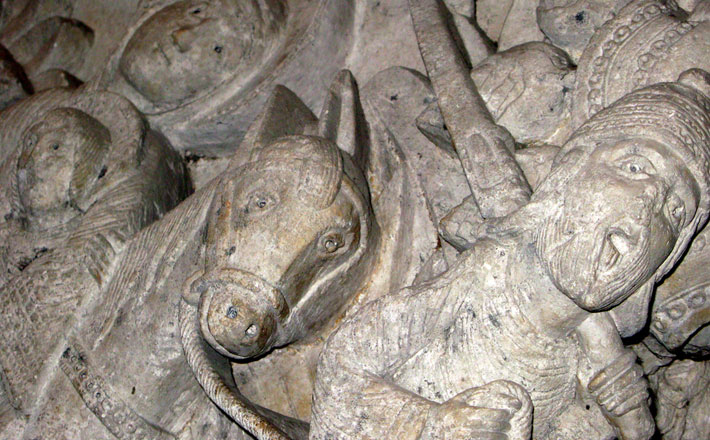Commentary on 1 Peter 4:12-19
In the United States, the American Dream is often proclaimed as if it were gospel: anyone who works hard and makes good choices can be happy and successful.
The author of 1 Peter understands the gospel and its consequences quite differently. Don’t be surprised, he says, at the fiery trial that you are experiencing. Don’t think it strange that you are suffering. Make good choices, by all means! But don’t expect that doing good will make you healthy, wealthy, and popular. Instead, rejoice as you share in the suffering of Jesus.
If we look at the biblical story, we soon see that doing God’s will is no guarantee that we will escape suffering. The Holy Innocents illustrate powerful peoples’ typical response to God’s work in the world. Herod reacted to the news the Messiah was born not by rejoicing and sending gifts for the baby shower, but by doing all he could to eliminate a perceived rival. Like 1 Peter’s audience, the slaughtered babies of Bethlehem and the parents who loved them suffered not because they had done anything wrong, but because someone rejected Jesus and felt threatened by God’s Good News.
Today’s passage from 1 Peter is not about the problem of suffering in general. It is not a reflection on why good people struggle with physical or mental illness or die in car accidents or have their lives overturned by natural disasters. It is a pastoral word of hope and reassurance for people who are facing abuse, social rejection, and public humiliation because they follow Jesus.
God’s work in and through Jesus is at the center of 1 Peter’s message. Jesus is the one through whose blood we have been ransomed (1:18–19) and through whose resurrection God gave us new birth (1:3). He is the living stone rejected by the builders but chosen by God (2:4), the cornerstone on which God’s house is built (2:5–8). And he is the suffering Christ in whose footsteps we are called to follow (2:21). If even Christ suffered, it should come as no surprise that his followers suffer too.
According to 1 Peter, the “fiery trial” that Christians in Asia Minor were experiencing was a test. Surface appearances can be deceptive. As Shakespeare famously put it, “All that glisters is not gold.” Like a fire that melts down metal and separates pure gold from contaminants and additives, suffering strips away externals. What is the effect? It reveals who we really are.
Although 1 Peter talks about suffering “in accordance with God’s will” (1 Peter 4:19), it does not say that God directly causes suffering. If we suffer while we are doing what is right and good, we are suffering in agreement with God’s will. The opposite would be sinning — choosing to live in a way that is not in accordance with God’s will — and suffering society’s usual consequences for criminal behavior. By contrast, if the world rejects us and reviles us for doing good, it is simply treating us as it treated Jesus.
1 Peter emphasizes that Christians must ensure that their actions actually are in accordance with God’s will. Though at least some of the readers have a highly questionable past (4:1–5), no one who follows Jesus should become a murderer, thief, or evildoer (4:15). Surely that much is obvious. The list of off-limits behavior ends with a surprise, though: NRSV translates the last word, allotriepiskopos, as “mischief maker,” but it really means something more like “busybody.” Christians are to avoid being bishops of everyone else; they are not called to oversee other peoples’ behavior. Facing social rejection because they are interfering nuisances is quite different from suffering for Jesus’ sake.
On the other hand, if people are ridiculed as “Christians,” if they are mocked as “Christ-lackeys” because they follow Jesus, they should not be ashamed. Being associated with Christ is not an insult, but a badge of honor. Here 1 Peter alludes to Jesus’ teaching in the Beatitudes: “Blessed are you when people revile you and persecute you and utter all kinds of evil against you falsely on my account. Rejoice and be glad, for your reward is great in heaven” (Matthew 5:11–12). Although the world may revile and shame Christians for following Jesus, God honors and blesses them. Whose opinion will count in the end?
1 Peter calls its readers to rejoice, not because suffering and rejection are good or desirable in themselves, but because when we are rejected for obeying God, we are partners in Christ’s experience. We enter the fellowship of his suffering. We know that God raised Jesus from the dead and exalted him to a place of honor, and we rejoice in anticipation, knowing that ultimately Christ’s glory will be revealed to the whole world.
When the world mocks us for following where Jesus leads, we can be filled with joy: the Spirit of glory, the very Spirit of God rests on us (cf. Isaiah 11:2). Like Jesus, we have been anointed with the Spirit. We are God’s house, the earthly dwelling-place of God.
We are called to be confident in God, but not complacent. As Christians we are not exempt from God’s judgment. On the contrary, 1 Peter says, judgment begins with God’s house(hold). God’s dwelling must be clean and holy. Painful though it may be, the refining fire purifies God’s people (cf. Mal 3:1–3). 1 Peter asks but does not answer the question: If even those who obey God find the process difficult, what will become of those who reject the gospel?
How should we live when we find ourselves passing through the refiner’s fire? 1 Peter calls us to trust in our creator, the judge who is trustworthy and just. Trusting God does not mean that we wait passively for the world to change. Like the one in whose footsteps we follow, we are called to action. We are called to do good in Christ’s name, to the honor and glory of God.


December 28, 2014